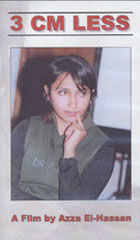
3 Cm Less 2003
Distributed by First Run/Icarus Films, 32 Court St., 21st Floor, Brooklyn, NY 11201; 800-876-1710
Produced Yamama Production House
Directed by Azza El-Hassan
VHS, color and b&w, 60 min.
Sr. High - Adult
Middle Eastern Studies, Human Rights, Media Studies, Multicultural Studies, Women's Studies
Date Entered: 08/31/2004
Reviewed by Patricia B. McGee, Coordinator of Media Services, Volpe Library & Media Center, Tennessee Technological UniversityAzza El-Hassan’s multilayered cinema diary is a film about the uses of documentary filmmaking in manipulating human lives, and the story of how two families try and use film to heal familial wounds. Hagar, now a 72 year old grandmother, brought her family of ten children and her husband Mahmoud’s body back to Palestine from Colombia after he was killed in a robbery. In the years since she left Palestine, the Israelis occupied it. Hagar spent eleven years in her struggle to regain her home and to force the Israelis to permit her children to settle in Ramallah. Her daughters wish to tell the story of their mother’s struggle and expose the consequences of her dispute. The youngest child, Sara, has been overwhelmed with feelings of abandonment and loss, while Samia, the oldest, resents that she was forced into the role of a parent. The children blame family dysfunction on their Mother’s failure to provide nurturing care.
Ra’eda hopes to use documentary film to connect to her late father, Ali. Ali kissed his children good-by early one morning in 1975 and together with colleagues hijacked a Sabena Airlines flight. Israeli troops storming the plane killed him. Ra’eda wants to use Azza’s camera to find her father by finding the people who knew him well and in the process bring some kind of finality to this painful episode in her life.
The film weaves a sometimes unsteady course between the stories of the Palestinians and the controlling voice of the director as auteur. It is clear that while El-Hassan is sympathetic to her subjects, she has also manipulated and judged them. She asks, “Hagar, how many victims do you have?” and staged a disastrous meeting in Haifa between Ra’eda and an actor who pretended to have known Ali.
3 Cm Less is also Azza’s story. Discouraged by her feeling that her film has failed to accomplish what she set out to do, she vows to stop using films to solve problems and comments that, “Films never ever changed reality.” When she returned to Ramallah she discovered her home had been searched and trashed by soldiers of the Israeli army.
At times the editing, as when old black and white home movies of Hagar’s children alternate with a black screen, can be more irritating than enlightening. Other times the film’s focus is annoyingly blurred. Aside from these technical considerations, 3 Cm Less asks important questions about the role of the documentary filmmaker and the impact the Middle East conflict has had upon generations of Palestinians. The title, 3 Cm Less, refers to the projection that this generation of Palestinian children will be that much shorter than their parents due to deprivation. A complex, difficult and flawed film, 3 CM Less rewards careful viewing.
Awards
- 2003 Marseilles Documentary Film Festival
- 2003 Amsterdam Shadow Festival